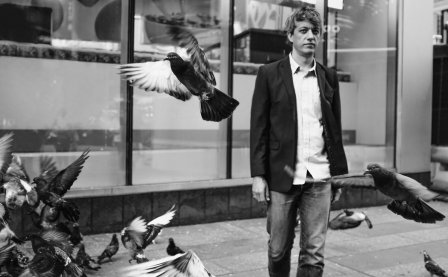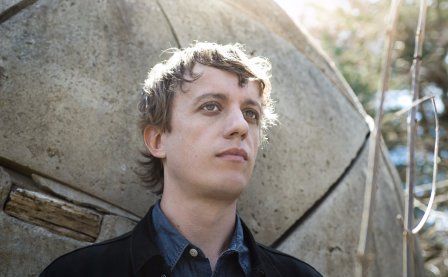Brooklyn-based guitarist and songwriter Steve Gunn is interested in other people. He spent years backing up other musicians, developing a collaborative spirit and an appreciation for new ideas. On his Kerouac-esque latest album, Eyes on the Lines, Gunn turns his narrative powers on characters inspired by people he’s met on the road. While Gunn’s music is optimistic, his chill persona resonates throughout the record. He strikes a balance between subject and self.
Gunn talked to Tiny Mix Tapes from the parking lot of a Motel 6 in New Hampshire.
I want to start with the new album. Eyes On the Lines conjures imagery of the open road. The theme is exploration and traveling. So who is the traveler here? Are the songs fictional, autobiographical, metaphorical, or something else?
I think it’s sort of a combination of both. I wrote a lot of the songs when I was on the road and was thinking about stories about being on the road. But a lot of the songs are necessarily from my perspective. I like to sometimes speak through characters. So I was inspired by people I ran into, and saw, and was observing. But I also like to mix it up and tell my own story. So it’s not just all about me.
Based on your songs, I would guess that you love to tour. Is that the case?
I really have loved traveling for a long time. The combination of playing music and being able to travel and being able to sustain it is something that I really enjoy. I mean it’s work just like anything else and it’s not easy all the time. But I do enjoy it.
Your music feels optimistic, almost uplifting. Is that a conscious artistic choice on your part or just the natural expression of your outlook on life?
I try to not brood too much and not be negative. I feel like there’s a certain amount of hopefulness in my music and I feel that way personally, too. I try to focus on that and be grateful for the band that I have and the opportunities that I’m getting. It stems from when I was a punk kid listening to my favorite band, Bad Brains, and they had this song called “Positive Mental Attitude.” So I try to keep that ethos with what I’m doing now. Because there’s no sense in being angry or distraught or overly stressed. You have to put things into perspective.
There’s almost an older vibe to your music. It’s happy and it makes me happy when I listen to it. A lot of music today comes off as self-involved and depressing.
Yeah, I miss that. Now I feel like it’s all about people’s ego and who they are and what kind of character they’re trying to portray and how they’re duping people into thinking they’re somebody else. For me it’s about others. Music used to try to keep that perspective. Personally, I like a lot of different kinds of music. But you can tell when it’s overly selfish. And I also think sometimes people’s personas are just a bunch of bullshit. I like to work on music and do as best I can and not get caught up in being someone that I’m not.
Music can serve a lot of different kinds of people, not just middle-class white hipsters. There’s a lot of other kinds of people in the world and you have to be aware of your surroundings and respectful of everyone. Try to think about people outside of your parameters socially. For me that’s where some of the more interesting stories come from.
One of my favorite songs on the record is “Heavy Sails,” in which you juxtapose beautiful natural scenes with the grit of New York City. You’re living in Brooklyn now. Are those lyrics true to your feelings about the city?
That’s interesting. I feel like that’s one of the lost songs on the record. We haven’t played it yet, hopefully we will at some point. Yeah, that’s kind of the coming-back-to-the-city song. I haven’t been home very much the past couple years. I’m always moving around. I have this complicated relationship with New York. I do love living there and I sometimes miss it. I have these moments where I’ve been gone for a while and I’m standing on a subway platform and seeing the things about the city — not necessarily that I like — but that are always around. So I have mixed feelings about it and that’s what the song is about. Like being out to sea and then back to your home that’s always a strange and mysterious place.
I have always been impressed by your ability to meld technical skill with accessibility. Your playing is complex and intricate but doesn’t overwhelm the music and make it all about the solos. How do you strike that balance? Do you ever have to restrain yourself?
It’s taken some years to not be overly indulgent. I play guitar a lot by myself, and when I started singing my songs were overly complicated. When I first started my guitar playing, that was too complicated. Now when I’m thinking about songs in general, and now that I’m playing with another guitar player, I like to keep things fairly simple. I come up with these long, cyclical, rhythmic guitar lines. I come from the school of sonic guitar leads rather than technical stuff. So I like to combine the sort of strange knowledge of music and pushing the limits of sound.
Are you self-taught?
I come from a time where there were a lot of kids playing guitar when they were 12 or 13. I was playing sports and my parents are pretty musical. I expressed interest in playing and they were really supportive. I took lessons for a couple of years. I wanted to just jump around in my bedroom and play power chords. So I did get the basic knowledge early on and then just took it from there. When I matured a little bit and finished high school I delved into jazz and started trying to figure stuff out by ear.
What kind of music scene were you exposed to as a kid?
I was all over the place musically. Just grabbing at everything. I watched a lot of MTV. I had an older sister who was into punk and she listened to goth music and stuff, so I discovered The Cure andThe Smiths and Bauhaus and Joy Division and New Order. Then in the 90s rap was exploding so I listened to a lot of rap. Then I got into local bands and more DIY punk stuff. I was mail ordering 7-inches and things like that.
In an article in The Guardian you talked about your favorite guitarists, including Bert Jansch and Hendrix. Their influences are pretty clear in your sound. You also mentioned Greg Ginn. Black Flag is not the first thing that comes to mind when I think of Steve Gunn. How have they and other punk bands affected your music?
It’s hard to hear that influence. I think that I just listed him as a favorite because he has a really unique playing style. It’s pretty free. And I’d like to think that maybe that sort of risky playing is something that I incorporate into what I do. It might not necessarily sound like what he does. But just to have that approach and that option when things are getting a little crazy.
You’ve spent so many years playing guitar in other people’s projects. What has the transition been like going from guitarist to being the face on the cover of the record?
I still do a lot of collaborative stuff and hope to do more. But the band became more of a focus as I got more recording under my belt and made more albums and toured. It slowly started taking up most of my time over the span of a few years.
Is there anything else you’d like to talk about?
I’m just happy to be on the road with such a good band. And I’m looking forward to making another record.
More about: Steve Gunn



